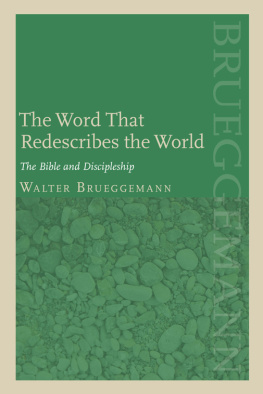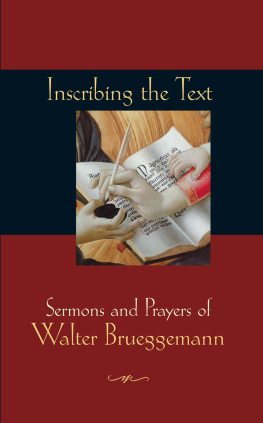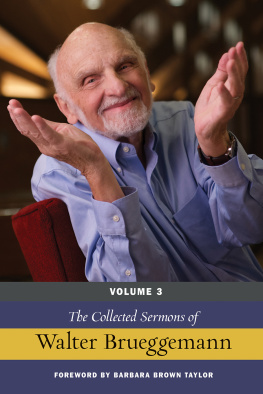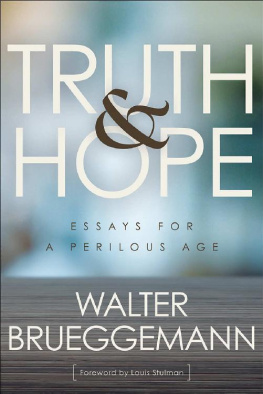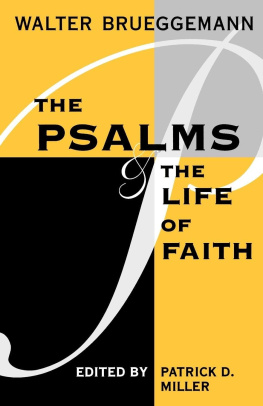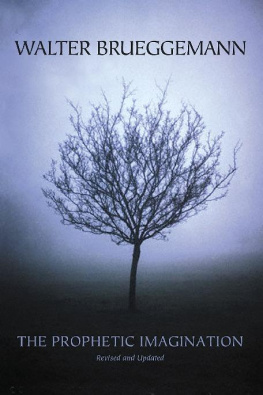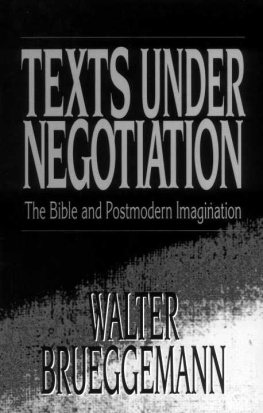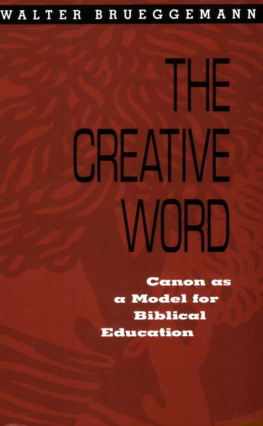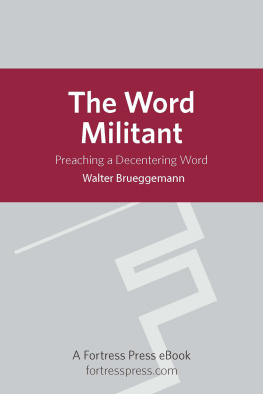
The Word That Redescribes the World
The Word That Redescribes the World
The Bible and Discipleship
W ALTER B RUEGGEMANN
Edited by Patrick D. Miller
F ORTRESS P RESS
Minneapolis
THE WORD THAT REDESCRIBES THE WORLD
The Bible and Discipleship
First Fortress Press paperback edition 2011
Copyright 2006 Fortress Press. All rights reserved. Except for brief quotations in critical articles or reviews, no part of this book may be reproduced in any manner without prior written permission from the publisher. Visit http://www.augsburgfortress.org/copyrights/ or write to Permissions, Augsburg Fortress, Box 1209, Minneapolis, MN 55440.
Scripture quotations are from the New Revised Standard Version Bible, copyright 1989 by the Division of Christian Education of the National Council of the Churches of Christ in the USA. Used by permission. All rights reserved.
Cover design: Kevin van der Leek Design Inc.
Cover photo: Trinette Reed/Photodisc/Getty Images. Used by permission.
Interior design: Beth Wright, Trio Bookworks
eISBN 9781451419818
ISBN 978-0-8006-9829-4
The Library of Congress cataloged the hardcover edition as follows:
Library of Congress Cataloging-in-Publication Data
Brueggemann, Walter.
The Word that redescribes the world : the Bible and discipleship /
Walter Brueggemann ; edited by Patrick D. Miller.
p.cm.
Includes bibliographical references (p. ) and indexes.
ISBN 0-8006-3814-X (alk. paper)
1. Theology. 2. Christianity and culture. I. Miller, Patrick D. II. Title.
BT22.B78 2006
230.041dc22
2005035387
For
Lee Carroll
and
Erskine Clarke
Contents
T he beginning point for this new collection of Walter Brueggemanns essays is not new at all. It is where he always beginswith the text of Scripture. Few persons in our time have been more committed in theory and practice to the significance of the words of Scripture for faith and life, for our time and for all times. Few also have been more self-consciously attentive to the problematic of the biblical text as much as to its possibility. There is a candora favorite word of Brueggemannsto his interpretive work that does not hide or flinch from the alien character of the Bible and its humanity. Surely no contemporary interpreter better exemplifies Luthers image of the Bible as the Word of God in a very human, crude manger. Both the danger and the power of the word of Scripture are lifted up in his writing. So also he has insisted, and not without some strong opposition on the part of other capable interpreters, that we have no access to the reality of God except through Scripture. Its interpretation is thus difficult, dangerous, and absolutely necessary.
In what follows, my comments are not aimed at a summary of the essays. Rather I would point the reader to some of the themes and notes that are sounded throughout all of them. Each one is discrete in its focus and emphasis, but they also overlap in significant ways. So here are some of the things to watch for:
1. In the opening essays of this book and throughout, one encounters a mode of looking that is confrontational, not so much between author and reader as between text and the world in which we live. It is the text that confronts us and makes us uneasy or calls us to a new attention and consideration. At one point (Proclamatory Confrontations), Brueggemann speaks of preaching as truth speaking to power. He is not unaware of the ambiguity of both truth and power. Indeed, he underscores the problematic. Yet there is a sense in which all of the essays here embody that definition of preaching as they place the text of Scripture, with its judgment and its hope, against the realities of the world in which we live.
2. That judgment and hope are always before the reader. One will note how often Israels experience of exile is the focus of attention. It is precisely there that the community comes to know both judgment and hope. Brueggemann thinks that exile is not simply a moment in the history of ancient Israel. It is a metaphor for the churchs contemporary existence. From careful attention to Israels story of exile, the church mayand he would underscore the may because he is not primarily an optimistdiscover where it is and why, what its future holds, and what is required for faithfulness in our time. A lot of attention is given these days to the significance of the exile and its aftermath as the time of composition of much of the Old Testament. Brueggemann is less interested in that literary history and more interested in whether the experience erupting in the text of Scripture can break through our academic arguments to mirror the present even as it tells the story of the past. After all, why do we bother to hold on to these texts?
3. Israels way of holding on to the story that carried them through the present and into the future was by way of memory. Remembering forward and hoping backward is a construct that Dietrich Ritschl has used in his Christology (Memory and Hope: An Inquiry Concerning the Presence of Christ). It is also a way of thinking and living that is lifted up in Brueggemanns continuing recall of the biblical story, of the credo, of the redemptive acts of God, and his insistence that such memory is what feeds hope and creates identity.
4. Indeed, a concern for identity, which he finds so heavily in Scripture, is one of the communal requirements Brueggemann lays upon the contemporary church. Whatever marks go into that identity seem to come from an ethos that is heavily counter to the present way of living in this world. So again and again, Brueggemann hears the text of Scripture pressuring against the way things are and proposing an alternative or counter waya counter culture, a counter lifestyle, a counter world, a counter economics. Brueggemann is deeply convinced that we have succumbed to a consumerist culture reflected in businesswhose capitalist underpinnings are presumed as inherent and exclusive of other modessports, entertainment, and not least politics. At one point he asks: How shall we practice a distinctive ethic of humanness in a society massively driven by the forces of the market economy toward an ethic of individualism that issues in social indifference and anti-neighborliness? (151). The only way out of such a living death is via an ethic of resistance. Possible answers to his question, however, are not confined to its immediate context. They are present throughout this collection of essays.
5. Among the necessities emphasized by Brueggemann are modes of practice and the possibility of imagining a different way and a different world. As it was with Israel, so it should be with those for whom Israels story is definitive. Especially in the Torah but also in the story, Israel defined itself by various practices that both reflected its fidelity to the Lord and marked the community off from others without turning its back on the other. As Brueggemann notes in these essays, like the people of God from the beginning, the church has to live between peculiarity and pluralism, between shaping ourselves as a different peopledifferent not in our humanness but in our obedienceand living in relation to the other who is our immediate neighbor and also to the nation far off. For Brueggemann as he reads the prophets and the story, this is only possible by a constant use of imagination to evoke a new and different world. The prophetic imagination gives us the equipment to exercise our own imaginations against the culture and against the economic and political modes that seem to define our lives and continuously undercut our obedience to the one God who has redeemed and called us. If you are not sure how to use that equipment, Brueggemann is a helpful guide.
Next page
